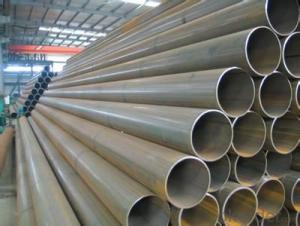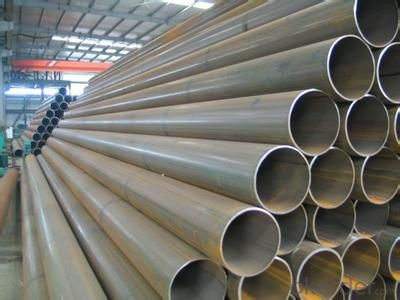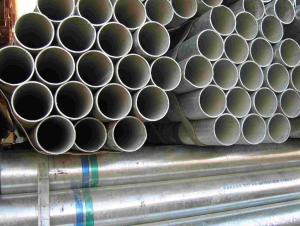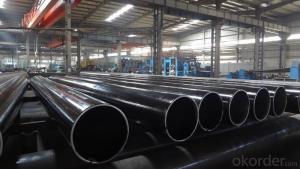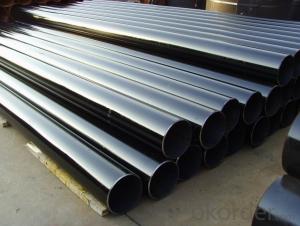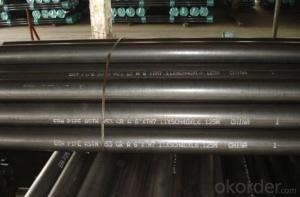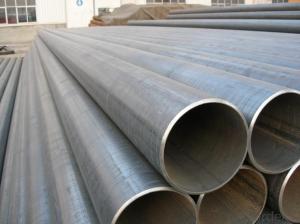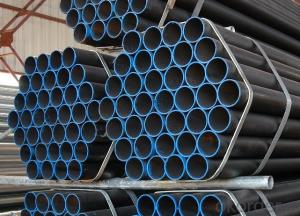ASME API 5L High Quality ERW Welding Steel Pipe
- Loading Port:
- Tianjin
- Payment Terms:
- TT or LC
- Min Order Qty:
- 25 m.t.
- Supply Capability:
- 10000 m.t./month
OKorder Service Pledge
OKorder Financial Service
You Might Also Like
1、Structure of Welded Steel Tube:
We are company that have many years experience and professional manager team and engineer team and sales team, sure we will provide you high quality of pipe and professioanl service.Welded Steel Tube is formed by drawing a solid billet over a piercing rod to create the hollow shell. We are company that have many years experience and professional manager team and engineer team and sales team, sure we will provide you high quality of welded pipe and professioanl service.
2、Main Features of the Welded Steel Tube:
• High manufacturing accuracy
• The higher strength
• The small inertia resistance
• Strong heat dissipation ability
• Good visual effect
• Satisfy price
3、Welded Steel Tube Specification:
Standard | GB, DIN, ASTM ASTM A106-2006, ASTM A53-2007 |
Grade | 10#-45#, 16Mn 10#, 20#, 45#, 16Mn |
Thickness | 8 - 33 mm |
Section Shape | Round |
Outer Diameter | 133 - 219 mm |
Place of Origin | Shandong, China (Mainland) |
Secondary Or Not | Non-secondary |
Application | Hydraulic Pipe |
Technique | Cold Drawn |
Certification | API |
Surface Treatment | factory state or painted black |
Special Pipe | API Pipe |
Alloy Or Not | Non-alloy |
Length | 5-12M |
Outer Diameter | 21.3-610mm |
Grade | 20#, 45#, Q345, API J55, API K55, API L80, API N80, API P110, A53B |
Standard | ASME, ASTM |
1) Material:20#(ASTM A 106/A53 GRB.API5LGRB,GB),45#,16Mn,10#.
2) Specification range:OD:21.3-610mm,WT:6-70mm,length:6-12m or according to the requirement of clients.
3) Excutive standards:GB,ASME API5L.ASTM A 106/A53,Despite of the above standards,we can also supply seamless steel pipe with standard of DIN,JIS,and so on,and also develop new products according to the requirements of our clients!
4) Surface:black lacquered,varnish coating or galvanized.
5) Ends:Beveled or square cut,plastic capped,painted.
6) Packing:bundles wrapped with strong steel strip,seaworthy packing.
4、Packaging & Delivery
Packaging Details: | seaworthy package,bundles wrapped with strong steel strip |
Delivery Detail: | 15-30days after received 30%TT |
5、FAQ of Welded Steel Tube:
①How is the quality of your products?
Our products are strictly in accordance with international and domestic standard. We test on every pipe before delivery. Any quality certification or testing report you want to see, please tell us.
Guaranteed: If products’ quality is not in accordance with description as we provide or the promise before you place order, we promise 100% refund.
②How about the price?
Yes, we are factory and be capable of offering you the lowest price. One of our policy is that “ to save time and be absolutely honest with our business relationship, we quote as low as possible for every client, and discount can be given according to the quantity”, if you are interested in bargain and dissatisfy our factory price, just don’t waste your time. Our quotation is professional.
③Why should you choose us?
Choice happens because of our quality and price. Additionally, we can also offer professional products inquiry, products knowledge train (for agents), fast goods delivery, outstanding customer solution proposals. Our service formula: good quality + good price + good service=customer’s trust.
SGS test is available. Customer inspection before shipping is welcome. Third party inspection is OK.
6、 Welded Steel Tube Images:
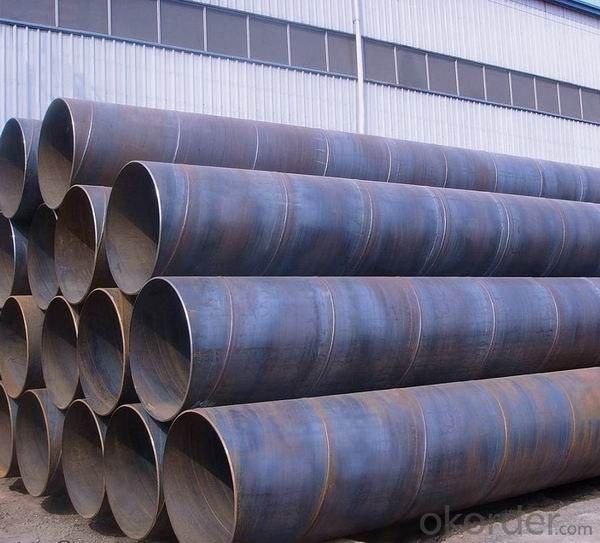
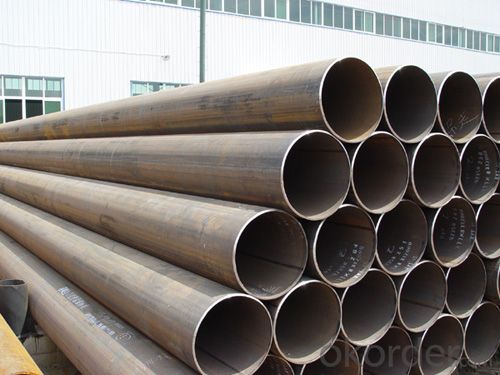
- Q: What are the advantages of using steel pipes in irrigation systems?
- There are several advantages to using steel pipes in irrigation systems. Firstly, steel pipes are highly durable and resistant to corrosion, providing a longer lifespan compared to other materials. This ensures the longevity and reliability of the irrigation system. Additionally, steel pipes have a high tensile strength, allowing them to withstand high pressure and heavy loads, making them suitable for various irrigation applications. Moreover, steel pipes have a smooth interior surface, minimizing friction and allowing for efficient water flow, which is crucial for irrigation efficiency. Lastly, steel pipes are recyclable, making them an environmentally friendly choice for irrigation systems.
- Q: Can steel pipes be used for underground stormwater systems?
- Indeed, underground stormwater systems can utilize steel pipes. Renowned for their resilience and robustness, steel pipes are apt for enduring the pressure and burden of such systems. Furthermore, steel pipes possess remarkable resistance against corrosion, a crucial attribute when handling stormwater potentially laden with diverse pollutants. Nevertheless, it is imperative to adequately coat and safeguard the steel pipes to avert any potential corrosion or harm over time. Routine maintenance and inspections should also be undertaken to guarantee the integrity of the steel pipes and the overall efficacy of the underground stormwater system.
- Q: Can steel pipes be used for geothermal heating systems?
- Yes, steel pipes can be used for geothermal heating systems. Steel pipes are commonly used in the construction of geothermal systems due to their durability, high heat transfer capabilities, and resistance to corrosion. They are capable of withstanding the high temperatures and pressure associated with geothermal heating systems, making them an ideal choice for transporting and distributing the geothermal fluid.
- Q: How do steel pipes perform in high-temperature environments?
- Steel pipes perform well in high-temperature environments due to their excellent heat resistance and thermal conductivity. The strength and structural integrity of steel pipes remain largely unaffected, making them ideal for applications such as steam lines, boiler tubes, and high-temperature industrial processes.
- Q: How do steel pipes handle water erosion?
- Steel pipes handle water erosion well due to their inherent strength and durability. The smooth surface of steel pipes helps to minimize friction and reduce the potential for erosion. Additionally, the corrosion-resistant nature of steel prevents rusting, ensuring long-term protection against water erosion.
- Q: What are the different threading options for steel pipes?
- The different threading options for steel pipes include tapered thread, straight thread, and multiple thread options. Tapered threads are commonly used for pipes that carry fluids or gases under pressure, as they provide a tight seal. Straight threads are used for pipes that require a secure connection but do not need to be sealed tightly. Multiple thread options, such as double and triple threads, are used for high-pressure applications where a stronger connection is needed.
- Q: What is the difference between ERW and SAW steel pipes?
- ERW (Electric Resistance Welded) steel pipes are manufactured by welding the edges of the steel strip or coil together to form a pipe. On the other hand, SAW (Submerged Arc Welded) steel pipes are manufactured by welding the steel plates or coils together using a submerged arc welding process. The main difference between the two is the method of welding used. SAW pipes generally have a higher strength and better dimensional accuracy compared to ERW pipes.
- Q: What are the different types of connections used with steel pipes?
- The different types of connections used with steel pipes include threaded connections, welded connections, and flanged connections.
- Q: How do steel pipes handle high-velocity flow?
- Steel pipes are highly capable of handling high-velocity flow due to their inherent strength and durability. The robustness of steel allows it to withstand the pressure exerted by the high-velocity flow, minimizing the risk of deformation or failure. Additionally, steel pipes have smooth interiors, which reduces frictional losses and ensures efficient flow rates even at high velocities.
- Q: Can steel pipes be used for power plant construction?
- Yes, steel pipes can be used for power plant construction. Steel pipes are commonly employed in power plants for various applications such as the transportation of fluids, steam, and gases, as well as for structural support. They offer high strength, durability, and resistance to extreme temperatures and pressures, making them suitable for the demanding conditions found in power plants.
Send your message to us
ASME API 5L High Quality ERW Welding Steel Pipe
- Loading Port:
- Tianjin
- Payment Terms:
- TT or LC
- Min Order Qty:
- 25 m.t.
- Supply Capability:
- 10000 m.t./month
OKorder Service Pledge
OKorder Financial Service
Similar products
Hot products
Hot Searches
Related keywords
